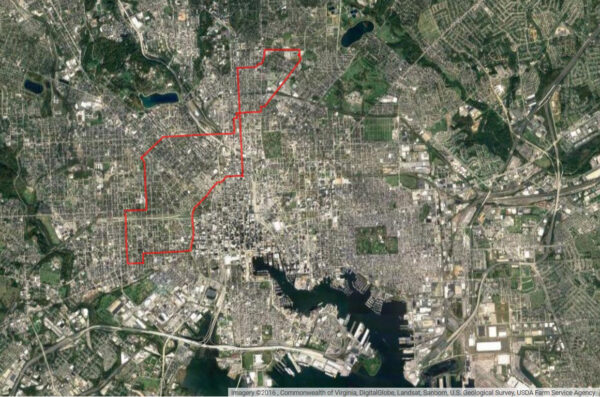Federal Appeals Court Rules Baltimore Aerial Surveillance Program is Unconstitutional
BALTIMORE — The Fourth Circuit Court of Appeals, sitting en banc, ruled today that the Baltimore Police Department’s (BPD) aerial surveillance program, which put the daytime movements of virtually all Baltimore residents under surveillance for 12 hours a day over six months, is unconstitutional. The decision comes in a lawsuit filed by a group of Black activist leaders in Baltimore, with the support of the American Civil Liberties Union and ACLU of Maryland, requesting that the court temporarily block the BPD from deploying and conducting a six-month trial of the aerial surveillance program. Although the Fourth Circuit heard the plaintiffs’ appeal after the six-month trial of surveillance flights had already come to an end, the BPD continued to possess unlawfully acquired data, and the court’s decision will mean that the BPD will be prohibited from accessing data collected through the program.
The BPD contracted with a private company, Persistent Surveillance Systems (PSS), to pilot this program, which flew planes equipped with powerful wide-angle cameras over the entire city of Baltimore during daylight hours. The BPD has stated the program’s intended purpose was to aid in solving criminal investigations. However, government agencies have a history of secretly using similar technology for other purposes — including to surveil Black Lives Matter protests in Baltimore in recent years. In February, the city of Baltimore voted to alter its contract with PSS, but it continued to hold a vast amount of data collected unconstitutionally under the program.
The court’s ruling found that the BPD’s surveillance system violates the Fourth Amendment because persistent surveillance of outdoor movements invades people’s reasonable expectation of privacy. It explained that “allowing the police to wield this power unchecked is anathema to the values enshrined in our Fourth Amendment.”
The lawsuit was brought by Leaders of a Beautiful Struggle, a grassroots think tank that advances the public policy interests of Black people in Baltimore; Erricka Bridgeford, co-founder of the Baltimore Ceasefire 365 project; and Kevin James, a community organizer and hip-hop musician.
Below are comments from:
Ashley Gorski, senior staff attorney in the ACLU’s National Security Project: “The court’s landmark ruling makes clear that the Constitution forbids police departments from deploying this kind of dystopian aerial surveillance. The AIR program’s technology presents a society-changing threat to everyone’s privacy, and as we’ve argued, the program never should have been permitted to get off the ground.”
David Rocah, senior staff attorney at the ACLU of Maryland: “This victory underscores how we cannot ignore Baltimore’s history of racism, exclusion, and police abuse of Black residents when deciding on programs and practices that are supposed to keep people safe. Hopefully, this invasive spy planes technology now will be stopped once and for all, not just here in Baltimore but across the country.”
Plaintiff Dayvon Love, director of public policy, Leaders of a Beautiful Struggle: “As an organization that has done work to address issues of public safety, we have always been clear that the aerial surveillance program is not a legitimate or effective means of making our communities safer. We have always sought to challenge the racial imbued ideology of police-ism: the belief that all urban problems must be addressed primarily or exclusively through the lens of policing. And we are gratified that Chief Judge Gregory saw the importance of that challenge.”
Plaintiff Erricka Bridgeford, co-founder of Baltimore Ceasefire 365: “This victory has me in joyous tears. It reminds me to keep using our individual voices and our collective work to shift the culture of things. It reminds me that in the midst of all the hard work left to do, we are actually making history, each day. Today, I feel HOW we are our ancestors' wildest dreams.”
Plaintiff Kevin James, community organizer and hip-hop musician: “I’m glad we could stop the Baltimore Police Department from spying on ninety percent of Baltimore every day. I hope other police departments recognize this victory and pass on bringing spy planes to communities they’re supposed to serve.”
